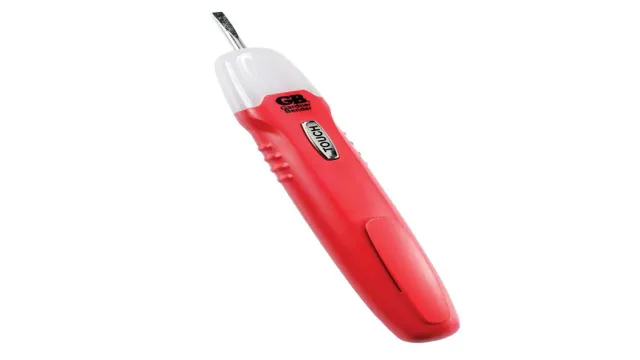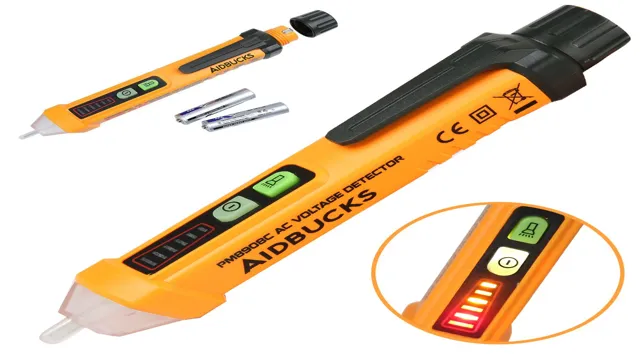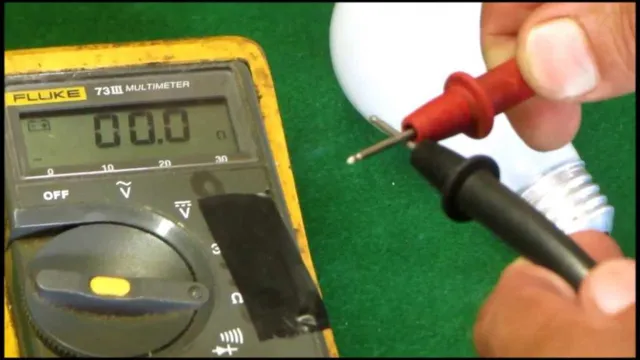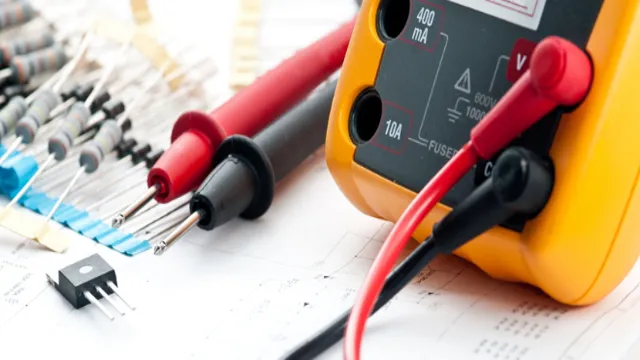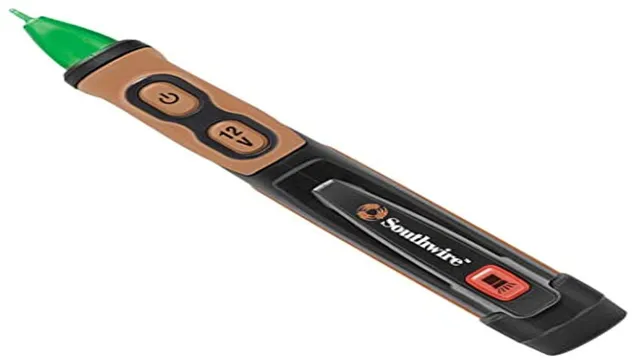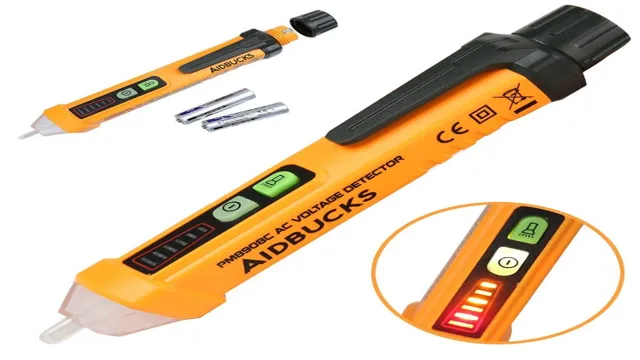How Much Is a Voltage Tester? A Comprehensive Guide to Determining the Affordable Pricing

If you’re working with electrical wiring, a voltage tester is an essential tool for ensuring safety. Not only can it help protect you from electrocution, but it can also help prevent damage to your electrical devices. However, many people wonder about the cost of a voltage tester and whether it’s worth the investment.
Is it something you can afford, or will it break the bank? In this blog post, we’ll take a closer look at the cost of a voltage tester and discuss some factors to consider when deciding whether to buy one. Whether you’re a DIY enthusiast or a professional electrician, this information will be invaluable to you. So, let’s dive in!
What is a Voltage Tester?
If you’re looking to purchase a voltage tester, the price can vary depending on the quality and features it has. On average, a basic voltage tester can range from $10-$30, while a higher-end, digital voltage tester can cost upwards of $100. However, the price shouldn’t be the only factor to consider when deciding which voltage tester to buy.
It’s important to think about the application in which you’ll be using the tester and the voltage range it can handle. Some voltage testers can only handle low voltages up to 500 volts, while others can handle higher voltages up to 1000 volts. Additionally, you’ll want to consider the type of display the voltage tester has, whether it’s a simple LED light or a more in-depth digital display.
Ultimately, investing in a high-quality voltage tester can save you time, money, and potential mishaps in the future.
Explanation & Functionality of Voltage Testers
A voltage tester is an essential tool for anyone dealing with electrical systems. It is designed to measure the electrical potential difference between two points in a circuit. This allows electricians and DIY enthusiasts to quickly and easily determine if there is voltage present in a wire or outlet.
Most voltage testers come in two types: contact and non-contact testers. Contact testers need to be physically touched to a wire or outlet for a reading to be taken, while non-contact testers can determine voltage without making direct contact. One of the main advantages of a voltage tester is its versatility.
It can be used to check if a circuit is active or not, troubleshoot malfunctioning electronic devices, and verify the proper wiring of outlets and switches. It is also relatively affordable and easy to use, making it accessible to anyone who needs to work with electricity. However, it is important to remember that voltage testers can only determine the presence of voltage, not the absence of it.
In other words, just because a voltage tester does not detect voltage in a wire or outlet does not mean that it is safe to handle. It is always best to follow proper electrical safety procedures and use additional tools like a multimeter when working with potentially dangerous electrical systems. In conclusion, a voltage tester is a crucial tool for anyone dealing with electrical systems.
Whether you are an electrician, DIY enthusiast, or simply need to troubleshoot an electrical issue at home, a voltage tester can quickly and easily determine the presence of voltage in a circuit. Just remember to always practice proper electrical safety and use additional tools as needed.
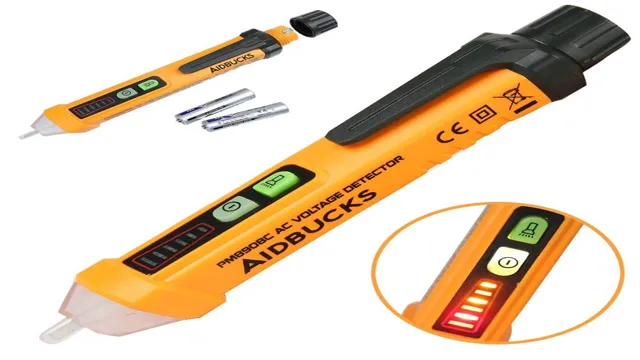
Types of Voltage Testers
If you’re looking for a voltage tester, you might be wondering about the different types available and how much you should expect to spend. There are a few common types of voltage testers, including non-contact testers, contact testers, and clamp meters. Non-contact testers use electromagnetic fields to detect voltage without physically touching the wire or device being tested.
Contact testers require direct contact with the wire or device to test for voltage. Clamp meters are helpful for testing current flow in addition to voltage. Prices for voltage testers can vary widely depending on the type and quality of the device.
You can find basic models for around $10-20, but more advanced models can cost upwards of $100. It’s important to make sure you’re getting a reliable and accurate device, especially if you’re using it for electrical work or troubleshooting. Consider your budget and the types of tests you’ll need to perform when choosing a voltage tester.
Non-Contact Voltage Testers
Non-Contact Voltage Testers When it comes to testing electrical voltage, there are different types of voltage testers available in the market. One of the most popular types of voltage testers is non-contact voltage testers. These testers work by detecting the presence of voltage without the need for direct contact with the electrical conductors.
Non-contact voltage testers use electromagnetic fields to detect the presence of voltage. They can detect voltage from a distance, which makes them a safer option to use compared to contact voltage testers that require direct contact with the electrical conductors. Non-contact voltage testers come in different types, including pen-style testers, clamp-on testers, and infrared testers.
Pen-style testers are the most common type of non-contact voltage testers, and they are shaped like a pen, making them easy to use. Clamp-on testers are used to measure voltage in wires, while infrared testers can detect hotspots in electrical panels. Non-contact voltage testers are a useful tool for electricians and DIYers, making them a must-have in any toolbox.
Contact Voltage Testers
Contact voltage testers are essential tools for every electrician and DIY enthusiast. They are used to detect the presence of electrical voltage in different conductive surfaces, such as wires, cables, outlets, and switches. There are different types of voltage testers available in the market, including non-contact voltage testers, contact voltage testers, and multimeters.
Non-contact voltage testers detect voltage without touching the surface, while contact voltage testers require physical contact with the surface. Multimeters, on the other hand, are devices that can measure voltage, current, and resistance. When choosing a voltage tester, it is crucial to consider factors such as accuracy, sensitivity, safety features, and ease of use.
Non-contact voltage testers are generally safer to use and easier to operate, making them ideal for beginners. However, contact voltage testers are more accurate and can detect low voltages that non-contact testers may miss. Overall, investing in a reliable voltage tester is essential to ensure your safety and the safety of those around you when working with electricity.
Combination Voltage Testers
Combination Voltage Testers Combination voltage testers are multipurpose testing tools that come with multiple features, making them versatile in nature. These testers can be used to measure voltage, continuity, and much more, making them an ideal choice for both professional electricians and DIY enthusiasts alike. There are different types of voltage testers available in the market, such as non-contact testers, digital multimeters, and analog multimeters.
Non-contact testers are typically used to test the presence of voltage without the need to touch the conductor. Digital multimeters, on the other hand, are versatile tools that can be used to measure various electrical parameters such as voltage, current, and resistance. Analog multimeters, while less commonly used today, are still popular among electricians and DIY enthusiasts due to their simplicity and durability.
Regardless of the type of voltage tester, safety is an important concern when working with electricity. Always ensure that the tester is properly rated for the task at hand and that you follow proper safety procedures when using it.
Factors Affecting the Price of Voltage Testers
If you’re thinking of buying a voltage tester, you might be wondering how much you should budget for this tool. The price of voltage testers varies depending on several factors. Firstly, the brand and quality of the voltage tester will affect the price – high-end brands tend to be more expensive, while budget brands are generally cheaper.
Secondly, the type of voltage tester also plays a significant role in pricing. Some testers are basic and can only detect voltage presence, while others have more advanced features like non-contact voltage detection or continuity testing. Thirdly, the size and portability of the voltage tester can also impact its price.
Smaller, more portable testers are typically more expensive than larger, less portable ones. Finally, the intended use of the voltage tester may also affect the cost. If you’re a professional electrician, you’ll likely want a more sophisticated tool than a homeowner who occasionally needs to check a circuit.
All in all, voltage testers can range in price from under $10 to several hundred dollars, so it’s important to consider your needs and budget when shopping for one.
Brand Name
Voltage Testers When it comes to purchasing a voltage tester, one of the biggest considerations is the price. The cost of a voltage tester can vary greatly depending on the brand name, features, and accuracy of the device. Generally, well-known brand names tend to be more expensive than lesser-known brands.
However, this may not always be the case, as some lesser-known brands may offer high-quality testers at a lower cost. Another important factor to consider when purchasing a voltage tester is its features. Voltage testers with additional features such as auto-ranging, backlighting, and audible alerts may cost more than basic models.
Accuracy is also an important consideration, as testers with higher accuracy levels tend to be more expensive. When it comes to choosing a voltage tester, it’s important to prioritize your needs and budget and choose a device that offers the necessary features and accuracy for your specific application.
Features and Capabilities
When it comes to purchasing a voltage tester, one of the key factors that affects the price is the features and capabilities it offers. Higher-priced models typically come with more advanced features, such as the ability to measure different types of voltage or to detect a wider range of electrical issues. Some voltage testers also come with additional capabilities, such as the ability to measure resistance or to test for continuity.
In addition to the features and capabilities offered, the brand and quality of the voltage tester can also have a significant impact on its price. It’s important to choose a voltage tester that meets your specific needs and budget, so you can ensure that you’re getting the best value for your money. By doing your research and comparing different models, you can find a voltage tester that is both affordable and reliably performs the tasks you need it for.
Type of Voltage Tester
When it comes to buying voltage testers, many factors can affect their prices. One of the most crucial factors is the type of voltage tester. Basic testers that can detect the presence or absence of voltage are typically cheaper than more advanced ones that perform multiple functions, such as measuring voltage levels and identifying the type of voltage.
In addition to the type of tester, the brand and quality of construction can also vary the price. Cheaper testers are often made with lower-quality materials and may not last as long as their higher-priced counterparts. Functionality is also a factor, with testers that measure AC and DC voltage typically costing more than those that only measure AC.
So, if you only need a basic tester, you can find one at a lower price. However, if you want a more advanced tester with multiple functions, you should expect to pay more.
Average Cost of Voltage Testers
If you’re wondering how much a voltage tester costs, the answer can vary depending on the type and quality of the tester. On average, a basic voltage tester can cost anywhere from $5 to $20, while a more advanced model with added features can range from $30 to $100. It’s important to note that investing in a high-quality tester can save you money in the long run, as it will provide accurate readings and last longer.
It’s also important to choose a voltage tester that meets safety standards to ensure that you’re protected while working with electricity. Overall, the cost of a voltage tester is a small price to pay for the peace of mind and safety it provides when working with electrical systems.
Price Comparison of Different Voltage Testers
When it comes to buying a voltage tester, one of the most common considerations is the price. The cost of a voltage tester can vary depending on the brand, features, and type. Generally speaking, a basic voltage tester can cost anywhere from $10 to $30, while a more advanced model can cost up to $100 or more.
However, it’s important to keep in mind that a higher price tag doesn’t always equate to better quality. When comparing different voltage testers, it’s best to consider the specific features that are important for your needs. This may include things like accuracy, reliability, and safety features.
It’s also a good idea to read reviews from other customers to get an idea of how well a particular voltage tester has performed for others. Ultimately, finding a voltage tester that meets your needs and fits within your budget is key.
Conclusion
So, in conclusion, how much is a voltage tester? Well, it all depends on your budget and needs. You can get a basic model for under $10, but if you want extra features like a built-in flashlight or non-contact voltage detection, you may need to spend closer to $30 or more. However, one thing is for sure – investing in a good voltage tester is priceless when it comes to ensuring the safety of yourself and your electrical system.
As the saying goes, it’s better to be safe than sorry – and in this case, a quality voltage tester is the best tool for the job. So, go ahead and treat yourself to the peace of mind that comes with a reliable voltage tester – it’s worth every penny!”
FAQs
What is a voltage tester used for?
A voltage tester is used to check the presence and amount of electrical voltage in a circuit.
How do you use a voltage tester?
To use a voltage tester, first ensure that the device is calibrated to measure the correct voltage range. Then, touch the metal tip of the tester to the part of the circuit being checked.
Can a voltage tester be used to test DC voltage?
Yes, many voltage testers are designed to measure both AC and DC voltage.
What is the price range for a basic voltage tester?
Basic voltage testers can range in price from $5 to $30.
Are there different types of voltage testers?
Yes, there are several types of voltage testers including non-contact testers, contact testers, and voltage detectors.
What safety precautions should be taken when using a voltage tester?
When using a voltage tester, you should always wear protective gloves and eyewear. Additionally, make sure the circuit is turned off and never touch metal parts of the tester with your bare hands.
Can voltage testers be used to test low voltage circuits?
Yes, many voltage testers are designed for use in low voltage circuits such as those found in automobiles or boats.


